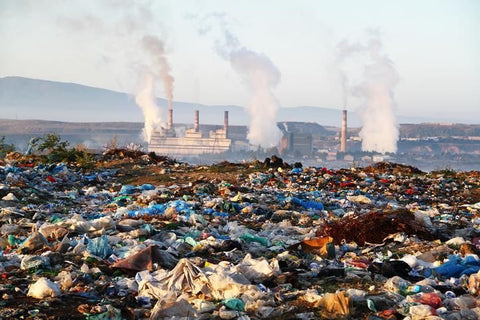Despite all the evidence, there are still climate deniers… some speak out on social media and others occupy seats in parliaments in some parts of the planet.
According to a survey analysed in the journal Global Environmental Change, Spain is the country with the fewest climate deniers (2% of the population) ; Australia, Norway and New Zealand, however, are at the top of the ranking, with 17%, 15% and 13% respectively.
The UN report on climate change
In early August 2021, a lengthy and comprehensive report presented by the UN raised the tone regarding the seriousness of the climatic transformation taking place on Earth .
Almost 4,000 pages of data and measurements, compiled over eight years by more than 200 scientists, are intended to serve as a "catalyst for citizen and institutional action" in the fight for climate change.
You can find the latest news from the United Nations on climate change: https://unfccc.int/en?gclid=EAIaIQobChMI-_KTutv_ggMVMZFoCR34kQsgEAAYAiAAEgIMD_D_BwE

Survey in 12 countries
In order to analyse the phenomenon of climate denialism and avoid the use of falsehoods that hinder social understanding of the problem, the University of Geneva (Switzerland) has published a study carried out on almost 7,000 participants from twelve countries. The research, published in the journal Nature Human Behavior, highlights the extremely persuasive nature of disinformation and the need to strengthen efforts to confront it rationally.
"Fighting disinformation about climate change is a major challenge for society," the university stresses in a note presenting the results of the new study. Although there is a scientific consensus on human responsibility for current climate change , in some countries up to a third of the population still doubts or questions this situation. "This phenomenon can be explained by the disinformation spread by certain companies and lobbies over the past 50 years," the Swiss university reiterates.
The phenomenon of misinformation weakens the support of a part of the population for climate policies , the authors of the study indicate.

Some of the arguments of the deniers…..
1. “Climate change is part of a natural cycle…”
While it is true that the climate has never stopped changing , the changes that have occurred since the Industrial Revolution are sufficiently exceptional - and widespread - to reject that idea. The warming projected for the near future is unprecedented in the past five million years.
2. “How can they talk about global warming when it’s still cold?...”
This phrase is in the top five of the most used by deniers. Even Donald Trump fell into this argument at one time.
To understand why this is not true, it is necessary to understand how global atmospheric circulation works and in particular, how the polar jet stream works, and although it may seem contradictory, global warming generates more cold waves.

3. “It’s just two degrees…”
Even small changes in average temperatures have unpredictable consequences … if the rise were to reach two degrees, 25% of the 80,000 species of plants and animals in 35 of the richest biodiversity areas of the world would be lost. If it were 4.5°C, the percentage would reach half. And the Earth has already warmed by 0.8°C since 1880, with obvious consequences: droughts, heat waves and more intense rainfall, floods, hurricanes and melting glaciers.
4. “Climate change will create more fertile areas…..”
While some plants respond well to higher levels of carbon dioxide (CO2) and global warming may open up new crop areas, the mechanisms that control the climate are too complex for us to accept that idea. As CO2 increases, not only do temperatures rise; rainfall patterns are altered and extreme weather events are magnified, factors that can put any crop at risk.
5. “Scientists manipulate data….”
For a conspiracy of this magnitude to be possible, thousands of researchers from almost 200 countries would have to come together. “Scientists continually correct and validate the information they gather”….
6. “Not all scientists confirm Climate Change…..”
It is true that there may be scientists who claim that Climate Change does not exist, but it is worth asking what kind of scientists can they be when the consensus in the scientific community is overwhelming and 97% agree on the existence of the phenomenon and the reason why it is occurring: human activity.
7. “Temperatures have not changed in the last 15 years….”
This is a matter of perspective, as the data can be misleading if we look at the last two decades. Since records began, 2016, 2017 and 2018 have been the warmest years on record. The WMO (World Meteorological Organization) notes that 2016 still holds the world record as the warmest year on Earth since modern records began and highlights that 2017 was the warmest year without the El Niño phenomenon.

8. “Pollution doesn’t kill anyone”
According to the World Health Organization, more than one million people die each year from urban air pollution . This is because residents of cities with high levels of air pollution suffer more from heart disease, respiratory problems and lung cancer than those living in urban areas with cleaner air. In addition, pollution increases the risk of asthma sufferers having an attack.
9. “Recycling is useless because they just put everything together”
The belief that “separating waste at home for later recycling is an unnecessary task because it is all mixed together again” is widespread, but the reality is the opposite: not only is it not mixed with other waste, but it is separated into subtypes of packaging to be used for different processes . Citizens only carry out the first filter in their homes.
10. “It is a global problem and what I do has no influence on general well-being”
Although individual actions are certainly not enough to solve the problem, they can be valuable contributions . For example, Ecoembes estimates that in 2019, thanks to the recycling of plastic containers, cans, cartons, and paper and cardboard, the emission of 1.67 million tons of CO2 into the atmosphere was avoided, equivalent to the emissions of coal power plants in Spain for two months.
It is very important not to underestimate the importance of individual actions, because they have a contagion effect on collective actions.
11. “Conspiracy theories”
Some climate change deniers believe in conspiracy theories suggesting that climate change is a hoax promoted by governments, international organisations or powerful groups to control the population or benefit economically, or even that it is caused by “fumigation” of products intended to control the climate from airplanes (chemtrails).

What can each of us do?
During these days of celebration, when we will share a table and get-togethers with friends and family, it is a good time to collaborate against climate change and try to persuade climate change deniers…but how can we do it? …here are some strategies based on psychology:
Inform with empathy : Sharing scientific information in an accessible and understandable way is essential, but communicating this data with empathy and understanding of the listener's situation and circumstances can increase the likelihood that climate change deniers will be more willing to pay attention.
Finding common ground : Talking about shared issues and concerns, such as health, the economy, or the desire for a better future for future generations. Establishing this connection can facilitate communication and help people feel less attacked and react negatively.

Use everyday metaphors and examples : Metaphors and examples related to everyday life can make complex scientific concepts easier to understand and remember. For example, comparing the greenhouse effect to a blanket that traps heat on Earth can be a simple but effective analogy, and is less threatening than an invisible gas whose effects are difficult to understand.
Encourage active participation : Climate change deniers are more likely to change their minds when they participate in sustainability-related activities, such as reforestation, beach clean-ups, or implementing renewable energy in their homes. This can help them better understand the issues and directly perceive the benefits of their actions and the harms they avoid.
Climate deniers are not monsters , but people who are afraid of a very real threat . Addressing climate denial and delay from a psychological perspective involves understanding the emotions and motivations behind these positions, and treating them with compassion and empathy.
https://www.greenpeace.org/argentina/blog/problemas/climayenergia/derrumbamos-5-mitos-sobre-el-cambio-climatico-con-datos-cientificos/
https://www.bbvaopenmind.com/ciencia/medioambiente/rebatir-los-negacionistas-la-crisis-climatica/
https://www.lavanguardia.com/natural/20231204/9417934/sigue-crezando-negacionismo-sobre-cambio-climatico-desinformacion-interesada.html
https://www.nationalgeographic.com.es/ciencia/8-argumentos-ante-negacionistas-cambio-climatico_14979
https://www.amnesty.org/es/what-we-do/climate-change/?utm_source=google&utm_medium=cpc&gad_source=1&gclid=EAIaIQobChMI0tPO4Nf_ggMV4YRoCR2iyAOsEAMYASAAEgJlGvD_BwE
https://ethic.es/2022/09/por-que-existen-los-negacionistas-climaticos/




Comments (0)
There are no comments for this article. Be the first one to leave a message!